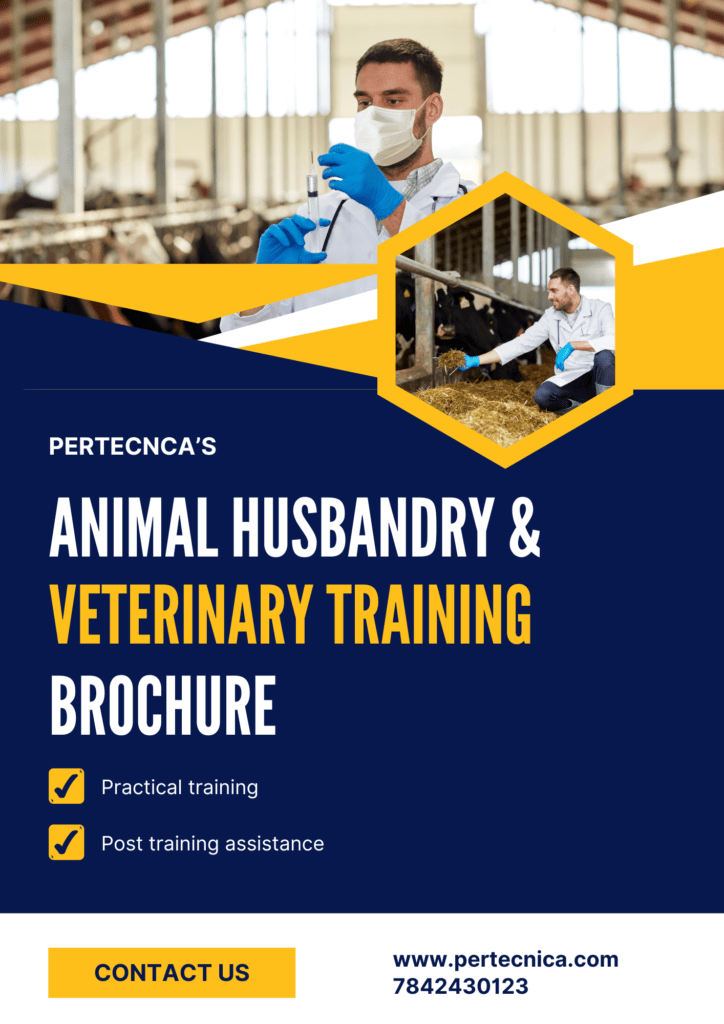Animal husbandry & Veterinary training
The Animal Husbandry and Veterinary Training Course is crafted to provide comprehensive knowledge and hands-on skills in managing and caring for livestock, focusing on health, breeding, nutrition, and disease management. This course is ideal for those aspiring to become professionals in animal husbandry, veterinary care, and livestock management, offering both theoretical knowledge and extensive practical training.
Course summary:
This course covers the essential aspects of animal husbandry and veterinary care, including livestock management, animal health, and breeding practices. Participants will gain the expertise to manage large herds, improve productivity, and ensure the health and welfare of livestock. The curriculum integrates modern technologies and sustainable practices to prepare students for the evolving demands of the industry.
- Proficiency in managing livestock health and nutrition
- Expertise in breeding and reproductive management
- Skills in disease prevention, diagnosis, and treatment
- Understanding of sustainable and ethical animal farming
- Ability to use technology in livestock management
- Business acumen for managing profitable animal farming operations
Practical training
- Livestock Health Management: Practical sessions on routine health checks, vaccination protocols, and disease management practices for cattle, sheep, goats, and poultry.
- Veterinary Diagnostics: Hands-on training in diagnosing common livestock diseases, including the use of diagnostic tools and laboratory testing.
- Nutritional Management: Practical experience in formulating and managing feed rations for different livestock species based on their nutritional needs and productivity goals.
- Breeding Practices: Practical sessions on artificial insemination, pregnancy diagnosis, and reproductive health management in cattle, sheep, and goats.
- Hygiene and Biosecurity Measures: Implementation of farm hygiene protocols, biosecurity measures, and sanitation practices to prevent the spread of diseases.
- Technology in Animal Husbandry: Training in the use of farm management software, health monitoring devices, and automated feeding systems to enhance livestock productivity and welfare.
- Animal Welfare Practices: Practical application of animal welfare standards, including proper handling, housing, and stress management techniques for livestock.
- Sustainable Farming Techniques: Hands-on experience in implementing eco-friendly farming practices, such as organic waste recycling, water conservation, and renewable energy use.
- Veterinary Case Studies: Analysis and hands-on treatment of real-world veterinary cases under the supervision of experienced veterinarians.
- Business Management Projects: Development of business plans, financial analysis, and profitability assessments for animal husbandry operations.
- Field Visits: Visits to modern dairy farms, poultry farms, and veterinary clinics to observe and engage in real-time farm operations and veterinary care.
Career scope
Upon completing the Animal husbandry & Veterinary training course, graduates can explore career opportunities in various sectors, including:
- Livestock Farm Manager
- Veterinary Assistant
- Animal Nutritionist
- Breeding Specialist
- Animal Welfare Officer
- Veterinary Consultant
- Farm Business Manager
- Animal Health Technician
- Livestock Inspector
- Poultry Farm Manager
- Dairy Farm Supervisor
- Agricultural Extension Officer
- Feed Mill Manager
- Animal Husbandry Technician
- Sustainable Farming Advocate

